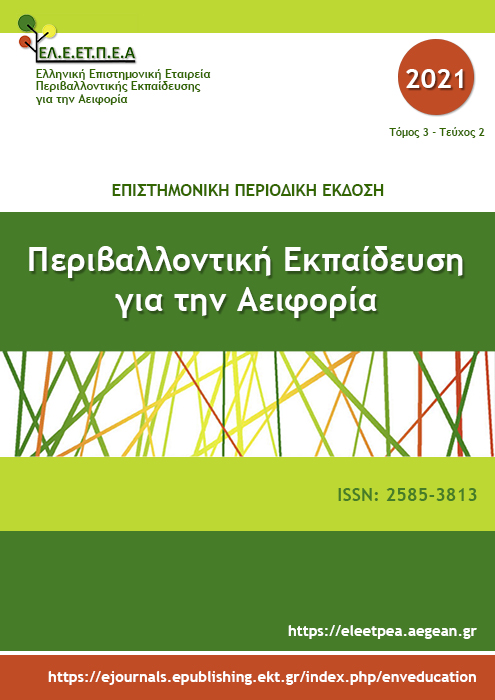Η Αειφόρος Ανάπτυξη στην Αρχική Εκπαίδευση και την Επιμόρφωση των Εκπαιδευτικών Πρωτοβάθμιας Εκπαίδευσης: Μια Επισκόπηση της Διεθνούς Βιβλιογραφίας

Περίληψη
Η αρχική εκπαίδευση και η επιμόρφωση των εκπαιδευτικών αναγνωρίζονται ως παράγοντες ουσιώδους σημασίας για την καλλιέργεια τα γνώσεων, των ικανοτήτων, των δεξιοτήτων, των στάσεων και των αξιών που πρεσβεύει η εκπαίδευση για την αειφορία. Η παρούσα εργασία αποσκοπεί στη διερεύνηση της προβληματικής που αναπτύσσεται στη διεθνή βιβλιογραφία και αφορά τόσο στη φυσιογνωμία των προγραμμάτων αρχικής εκπαίδευσης και επιμόρφωσης των εκπαιδευτικών Πρωτοβάθμιας Εκπαίδευσης, όσο και στα πορίσματα της διεθνούς βιβλιογραφίας για τους παράγοντες που επηρεάζουν την αξιοποίηση των αρχών της αειφορίας στη διδακτική πράξη. Η βιβλιογραφική επισκόπηση αξιοποίησε εμπειρικές έρευνες που εστιάζουν στην εκπαίδευση και την επιμόρφωση εκπαιδευτικών Πρωτοβάθμιας Εκπαίδευσης, όπως αυτές εντοπίστηκαν στις βάσεις δεδομένων Science Direct, Scopus, Web of Science, ERIC και Google Scholar. Μέσω της συστηματικής αναζήτησης, αξιολόγησης και ανάλυσης της βιβλιογραφίας εντοπίστηκαν 35 εργασίες που πληρούσαν τα κριτήρια που είχαν τεθεί στη βάση των ερευνητικών ερωτημάτων. Μέσα από την ανασκόπηση των ερευνητικών εργασιών υπογραμμίζεται η σημασία της σπουδής της αειφορίας, ως συγκροτημένου επιστημονικού πεδίου και τονίζεται η ανάγκη της καλλιέργειας της ικανότητας των εκπαιδευτικών να συνενώνουν στις διδακτικές τους πρακτικές την επαγγελματική τους ειδημοσύνη με τις αρχές της αειφορίας.
Λεπτομέρειες άρθρου
- Πώς να δημιουργήσετε Αναφορές
-
Στάχτιαρη Α., & Μουζάκης Χ. (2022). Η Αειφόρος Ανάπτυξη στην Αρχική Εκπαίδευση και την Επιμόρφωση των Εκπαιδευτικών Πρωτοβάθμιας Εκπαίδευσης: Μια Επισκόπηση της Διεθνούς Βιβλιογραφίας. Περιβαλλοντική Εκπαίδευση για την Αειφορία, 3(2), 1–21. https://doi.org/10.12681/ees.26736
- Ενότητα
- Articles

Αυτή η εργασία είναι αδειοδοτημένη υπό το CC Αναφορά Δημιουργού – Μη Εμπορική Χρήση – Παρόμοια Διανομή 4.0.
Οι συγγραφείς διατηρούν τα πνευματικά δικαιώματα και παρέχουν στο περιοδικό το δικαίωμα της πρώτης δημοσίευσης μαζί με την αδειοδότηση της εργασίας με CC-BY-NC-SA, που επιτρέπει σε άλλους να μοιράζονται αυτή την εργασία με αναγνώριση του συγγραφικού δικαιώματος και την αρχική δημοσίευση σε αυτό το περιοδικό.

